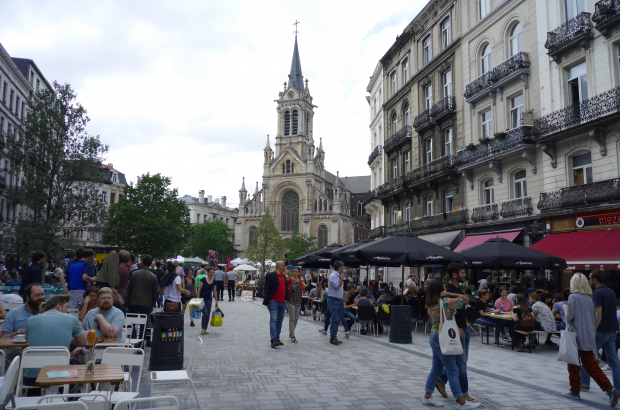- Daily & Weekly newsletters
- Buy & download The Bulletin
- Comment on our articles
Three Brussels municipalities issue new recommendations on co-living spaces
Three municipalities in the Brussels region have worked together on new recommendations to control the spread of co-living in the city.
The City of Brussels, Ixelles and Saint-Gilles want to curb the phenomenon in which entire houses are furnished for young cohabiting professionals as they say it puts pressure on the housing market and the neighbourhoods where the houses are situated.
In recent years, more and more houses have been set up for co-living. The concept offers young professionals a room in a large apartment with numerous common areas. Prices often start around €700 and the number of residents can reach more than 20. On the Parvis de Saint-Gilles, 21 residents share a co-living house which has a cinema, a meditation room, and a large communal dining and living area with a pool table.
In total, the region has more than 160 such houses, accounting for more than 1,500 rooms. Another 18 of those homes will open this year.
The buildings in question are mainly concentrated in Ixelles, Saint-Gilles and Brussels-City which has led these municipal authorities to compile new legal recommendations that should help better regulate the co-living scene.
They claim that co-living can have a lot of negative consequences. For example, classic single-family homes disappear from the market, new accommodation appears without planning permission, some neighbourhoods become more densely populated due to co-living, and the housing concept which brings together many young party-hungry residents can also cause problems for others in their neighbourhood.
The recommendations state that anyone intending to transform a single-family home into a co-living apartment of at least five rooms will need an urban planning permit before doing so as the adjustment to the existing house is considered to be a change of address. Co-living projects will now also be restricted to up to 12 rooms, the recommendations said.
The recommendations also state that a single room must be at least 14m² in size and there must be at least 10m² of common space for meals, and relaxation per inhabitant.
The three municipalities have also asked that companies that develop co-living projects - such as Cohabs and Ikoab - transform industrial buildings and office buildings into co-living projects instead. Co-living projects will also be rejected in favour of a classic residential arrangement should that alternative be presented by a competitor.
"We want to prevent many houses from being divided into luxury co-livings," says Brussels-City planning minister Ans Persoons. "This is very profitable but puts pressure on the housing market and makes it more difficult for Brussels residents to find affordable housing.
"To be clear: this has nothing to do with friends who are just going to live together. The luxury co-living houses have become an interesting financial proposition and are increasingly popping up. That's why we want to regulate them better."
The new recommendations have been in force since 17 June.


















